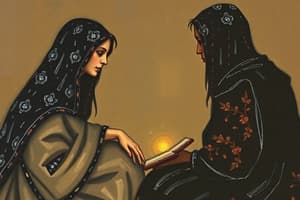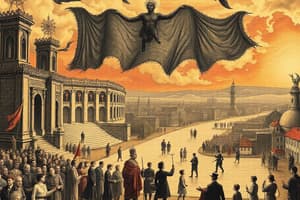Podcast
Questions and Answers
Which is a critique of the excerpt?
Which is a critique of the excerpt?
The effects of slavery are much worse than the effects of materialism.
What is the central idea of this excerpt?
What is the central idea of this excerpt?
The Utopians are not concerned about dressing fashionably.
This excerpt is most likely More's reaction to his society's
This excerpt is most likely More's reaction to his society's
greed.
What is the central idea of this excerpt?
What is the central idea of this excerpt?
Which should be included in a critique? (Check all that apply)
Which should be included in a critique? (Check all that apply)
This detail supports the central idea that riches are not important to Utopians. It is best described as a(n)
This detail supports the central idea that riches are not important to Utopians. It is best described as a(n)
Thomas More's fictional text about a society governed by reason and order is most likely a response to the conflict between
Thomas More's fictional text about a society governed by reason and order is most likely a response to the conflict between
Which historical fact will best help readers understand this excerpt?
Which historical fact will best help readers understand this excerpt?
Which statement provides a critique of the central idea?
Which statement provides a critique of the central idea?
Thomas More wrote Utopia during a period of
Thomas More wrote Utopia during a period of
Flashcards are hidden until you start studying
Study Notes
Central Ideas and Critiques
- Critique highlights that the adverse effects of slavery surpass the limitations of materialism.
- Utopians prioritize practicality over fashion, indicating a rejection of superficial values.
- More addresses the societal greed prevalent in his time, reflecting discontent with the values of his society.
Utopian Values
- Utopians express astonishment at the society's prioritization of valuable items such as jewels, cloth, and gold, showcasing their different value system.
- Riches are deemed insignificant by Utopians, and this notion is effectively illustrated through personal anecdotes that highlight their lifestyle choices.
Historical and Social Context
- More's narrative serves as a reaction to the tensions between the monarchy and ecclesiastical authorities, revealing underlying conflicts of his era.
- The exploration period influenced Utopians' perspectives, as explorers sought resources in the New World, shaping the economic landscape and values.
Supporting Evidence and Critiques
- A critique asserts that redistributing wealth from the affluent to assist the impoverished undermines the value of hard work.
- Effective critiques should encompass the central idea, supporting details, reader's perspective, and valid supporting evidence to present a comprehensive argument.
Historical Context of Utopia
- Utopia was composed during a time marked by economic growth and the rise of a middle class, indicating a shift in societal structures and economic power dynamics.
Studying That Suits You
Use AI to generate personalized quizzes and flashcards to suit your learning preferences.




